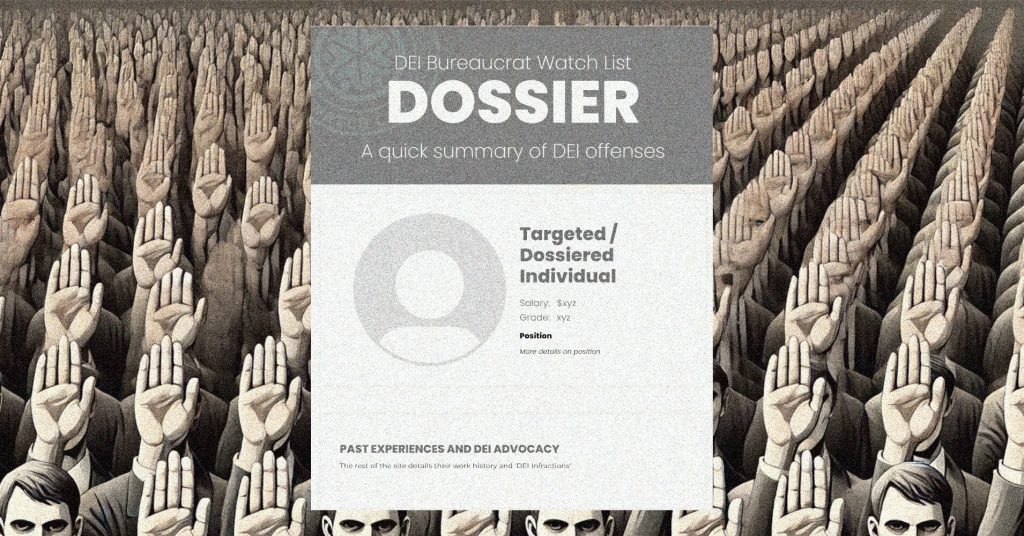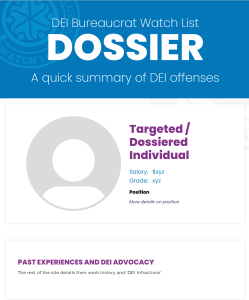
The emergence of the “DEI Watchlist” website which publicizes the information of 57 individuals who’ve supported DEI initiatives in the federal government has alarmed the targeted individuals, supporters of DEI, and opponents of President Trump’s agenda alike.
The website’s subtitle, ‘America’s Bureaucrats Most Abusing Diversity, Equity, and Inclusion,’ is awkwardly phrased and unclear. I found that much of the website’s texts have a similar lack of lucidity. Below the subtitle, a statement of purpose is given, but the stated purpose isn’t clear. It claims that “behind-the-scenes bureaucrats” push divisive DEI agendas at the expense of the American people, and by exposing these people to the public, this watchlist will help “restore integrity and common sense to our government.” There is no explicit call to action given, nor any explanation of how publicizing these individuals helps to resolve any problems stated or implied.
As poorly written as it may be, to what degree is it unethical, if at all? We cannot make a universal claim that publishing information about individuals without their consent is wrong, regardless of extenuating circumstance. We need to consider the context of a particular situation to make this determination. To what degree do the individuals involved have an expectation of privacy? What rationale is given for the publication? What call-to-action is invoked? How factual is the information provided? I can envision hypothetical scenarios where publishing information about government employees is not only ethical, but also urgently needed to advance civilian causes.
Imagine a fascist government consolidating power behind closed doors. The populace knows the president is merely a figurehead, executing orders from anonymous rulers who govern with crushing oppression. Its citizens have run organized protests in the past and have succeeded in removing presidents, but to no long-term benefit – replacing a figurehead with another figurehead doesn’t have any impact on the source of power itself. In this scenario, if an organization were to find these anonymous individuals, I would consider the act of publishing this information both ethical and crucial to the wellbeing of the population at large.
This may be considered an extreme example, but it shows that we cannot make blanket judgements that apply to all scenarios. With this in mind, we can’t claim that the publication of this DEI watchlist is unethical simply because it contains dossiers. We must consider the motivations of those responsible for publishing it, the calls-to-action it attempts to spur, the specifics of the information provided, and any other context the website provides.
Its “About” page introduces the organization responsible for this website and makes claims of its contributions to society, indirectly taking credit for notable events without any explanation of their role in said events. They purport to “deploy aggressive research and investigations to advance conservative messaging, rapid response, and Congressional investigations.” This declaration of intent is revealing of their intentions and the value they place in ethical principles as an organization. They claim to use research as a means of advancing their goals, but any research undertaken for the goal of advancing a preconceived narrative is antithetical to the nature of research itself. When research is conducted for the express goal of affirming an existing belief system, its methods become highly susceptible to cognitive biases, most notably confirmation bias, inevitably leading to the conclusion that the original researchers desired regardless of its veracity. Beyond that, what exactly does “rapid response” mean in this context, and isn’t “investigations to advance Congressional investigations” a bit of a tautology?
 The dossiers themselves follow a general template of the individual’s full name, government position, previous work history, current “woke initiatives,” and when available, their salary, donations, and even screenshots of LinkedIn posts. Some dossiers explicitly call out donations to the Democratic party as small as five dollars. Their support of DEI, Democrats, and in general, left-leaning principles, are heavily criticized with strawman arguments, clear misrepresentation, and misinformation, which I prefer to call lies. In a notable example, this organization accuses an individual of promoting structural racism, then direct quotes the following statement made by that individual’s organization: “Collectively, [UNITE] identifies and addresses any structural racism that may exist within the NIH and throughout the biomedical and behavioral workforce.” The misrepresentation is blatant, making it difficult to see this as anything other than a deliberate attempt to mislead its audience.
The dossiers themselves follow a general template of the individual’s full name, government position, previous work history, current “woke initiatives,” and when available, their salary, donations, and even screenshots of LinkedIn posts. Some dossiers explicitly call out donations to the Democratic party as small as five dollars. Their support of DEI, Democrats, and in general, left-leaning principles, are heavily criticized with strawman arguments, clear misrepresentation, and misinformation, which I prefer to call lies. In a notable example, this organization accuses an individual of promoting structural racism, then direct quotes the following statement made by that individual’s organization: “Collectively, [UNITE] identifies and addresses any structural racism that may exist within the NIH and throughout the biomedical and behavioral workforce.” The misrepresentation is blatant, making it difficult to see this as anything other than a deliberate attempt to mislead its audience.
Individuals targeted by the website expressed concerns over their safety, their family’s safety, and their ability to continue their careers unimpeded. Incidentally, the website did call them “targets” specifically before changing to “dossiers,” claiming that the change was only done for “stylistic” reasons. Advocacy groups have denounced the creation of this website as a dangerous action undertaken for the express goal of targeting individuals whose political ideologies differ from those of far-right Republicans.
I agree with this assessment. In my opinion, the website’s call-to-action is left intentionally vague for two reasons: to imply a call to violence or call to hostile attitude, and to let the website’s audience “fill in the blanks,” allowing them to decide their own call-to-action which they can implement. Additionally, the term “watchlist” implies a close surveillance of the individuals in question; perhaps including the term in the title of the website is meant to convey to those individuals that their actions are being watched and heavily scrutinized at all times. Many believe government officials should expect public scrutiny, a sentiment I share. However, we must distinguish between monitoring and critiquing their professional actions versus invading their privacy and targeting them personally.
This website doesn’t attempt to uncover any actual wrongdoing, it only serves to target individuals based on ideological differences, absent any evidence of misconduct. Ultimately, the website escalates political conflict rather than engaging with meaningful policy debates. It fuels division, reducing political discourse to ideological battles rather at the expense of productive discussions of governance.